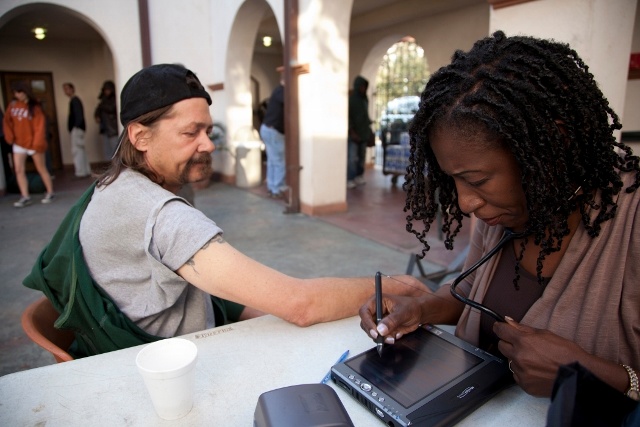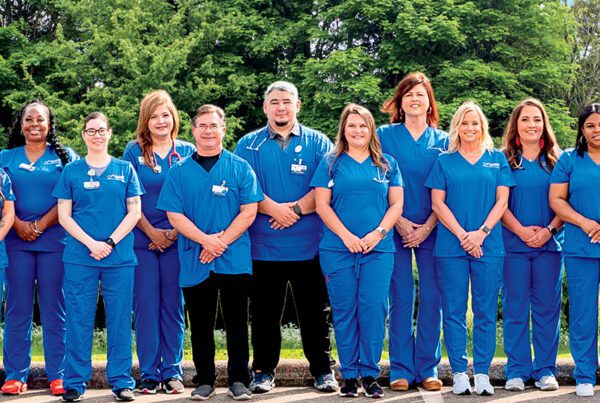From experience volunteering for those less fortunate than others, great beginnings emerge for the betterment of society. Such was the case with Dr. David Buck when he volunteered his services Mother Teresa and the Missionaries of Charity. He related the health disparities and systemic breakdowns he witnessed in India to ones that he saw in his home town of Houston. This prompted his interest in founding Healthcare for the Homeless-Houston (HHH).
Dr. Buck worked and volunteered in many community clinics in Houston throughout his medical school days at Baylor College of Medicine and early in his career as a physician. These experiences further exposed the enormous gap in effective health services for those who were the sickest and most vulnerable — namely, those who are homeless. In 1998, he recruited Frances E. Isbell, CEO of HHH, who has an extensive background in mental healthcare provision and policy work, and the two of them established HHH. Isbell recalls that it has been one of her greatest accomplishments to help Dr. Buck achieve his dream of founding HHH and establish an organization that would make this possible.
HHH was incorporated in 2000, received a 501(c) 3 nonprofit designation from the IRS in 2001, and was deemed Houston’s third federally qualified healthcare center by the Bureau of Primary Health Care in 2002. Currently, HHH operates three clinics, a dental clinic and various specialized programs and outreach services. HHH remains the only nonprofit federally qualified healthcare center in Houston that exclusively serves homeless individuals. They provide all of the services at no cost to the patients, and the patient population often has extremely complex health and social needs. These factors culminate to create high demand for the services provided, as they are unduplicated and essential to the community.
 From the original small section of Search Homeless Services, one of the city’s largest homeless day shelters, the donated space to HHH has grown from the two exam rooms with an adjacent dental chair to the utilizing floors within the Search building. The clinic within Search is now their largest clinical space, housing the medical and dental clinic, a counseling/psychiatry office, social services and case management offices, addiction counseling and administrative space.
From the original small section of Search Homeless Services, one of the city’s largest homeless day shelters, the donated space to HHH has grown from the two exam rooms with an adjacent dental chair to the utilizing floors within the Search building. The clinic within Search is now their largest clinical space, housing the medical and dental clinic, a counseling/psychiatry office, social services and case management offices, addiction counseling and administrative space.
The chief development officer, Carlie A. Brown explains, “As we became more established, the number of patients we were seeing that had been recently and repeatedly incarcerated in the county jail became more and more noticeable. Many came to us with active, untreated mental illness and had been stuck in a cycle between jail, the streets or shelters and public emergency centers. This cycle is referred to as ‘the revolving door phenomenon,’and it’s often the result of lack of continuity of care once released. In part, as a result to this systemic problem, HHH opened our second clinic site in late 2007, which we refer to as the ?Cathedral Clinic? because of its location adjacent to Christ Church Cathedral in downtown Houston.”
The “Cathedral Clinic” location is walking distance from the Harris County jail, easily facilitating the nationally-acclaimed Jail Inreach Project, and it’s adjacent to Christ Church Cathedral’s day shelter, The Beacon, which houses a variety of homeless services. This location also hosts the Women and Children’s Clinic on Tuesdays, and the Homes student-managed clinic and podiatry clinic on Sundays.
The third clinic is located within the Star of Hope Men’s Development Center and serves those who are being sheltered at that facility. Patients at this clinic are often funneled into more extensive services within one of the other larger clinics, depending on their specific needs.
In addition to all of these operating clinics and services, HHH provides medical street outreach at Palmer Way Station, a breakfast program located in the courtyard of Palmer Episcopal Church. A team including a primary care clinician and medical case manager engage with patients who are predominantly unsheltered — rather than in temporary housing, emergency shelters or transitional housing, and the like — with the overall goal of nurturing them into on-going clinical care within one of HHH’s integrated care clinics. HHH is in the initial planning stages of expanding this program into “club houses,” which are local day support and social centers for people with severe mental illness who are unsheltered.

HHH has grown exponentially since their inception. Isbell recalls, “In the first year, we had the capacity to serve fewer than 2,000 individuals. We are now serving between 9,000 and 10,000 men, women and children each year. In the past couple of years, our staff has grown to include more than 50 providers and support staff, and in 2014, 558 student and professional volunteers contributed 15,320 hours of service for an in-kind value of $412,204.”
In order to accommodate their growth and as a reflection of their key role in the community, HHH is in the midst of a capital project, marked by the purchase of an 18,000-square-foot building, which they began renovating at the end of January, 2015 and will move into at the end of the year. This relocation is spurred by high demand as well as expanded ability to supply services to the community.
HHH’s new location will double the amount of exam rooms, increase integration of primary care and behavioral health services as well as expand case management and social services, while also doubling the number of dental operatories from three to six and provide a ‘home base’ for the outreach teams.
This marks the next chapter in the history of the organization as an established and essential part of the city’s safety net system. Brown adds, “Our contracts with the city of Houston, The Harris County jail, the Mental Health and Mental Retardation Authority of Harris County, and Harris Health System underscore our role and reputation as leaders in the community for the provision of homeless healthcare in the nation’s fourth largest city.”
Despite the great need for mental healthcare, studies indicate there is a low adherence rate for behavioral health treatment when it is offered via traditional mental health channels. In addition to co-locating primary care and individual counseling, psychiatry and addiction counseling, in late 2008, HHH incorporated telepsychiatry into the clinical services to enhance the level of psychiatric care and to provide on-demand consultation for patients, as needed. HHH was the first homeless healthcare provider to pilot telepsychiatry. These services work well because the part-time psychiatrist cannot be at three locations at once. Additionally, those who come into the clinic in psychiatric crisis need immediate access to these services, rather than waiting for a next available appointment with the staff psychiatrist.
The network of psychiatrists that provide telepsychiatry services are familiar with HHH’s pharmaceutical formulary and work with staff clinicians to make prescribing decisions based on what they stock in their Class D pharmacies. Each clinic has on-site pharmacies to reduce patients’ barriers for their prescribed medication. Most of the patients cannot afford to fill prescriptions, are uninsured, and are often unlikely to go into a traditional drug store to fill a prescription because of stigma and discrimination. Director of Social Services, Kristina Arscott says, “Health is a basic building block for a good life. If you are struggling with symptoms from a chronic illness, like having headaches or hearing voices, it is difficult to concentrate, to organize, to be energetic, or to feel hopeful about the future. Having access to medication and healthcare can mean the difference between ‘existing’ and ‘living.’” Arscott elaborates, “I was drawn to this organization because it truly lives by its mission statement: health, hope and dignity. When people make decisions about what needs to be done or how to do it, they discuss these three ideas before acting.”
 HHH works with almost all of the public health entities serving homeless Houstonians, including the public hospital system which they began sharing an electronic health record with in 2012 to facilitate more coordinated care. They also have a record sharing agreement with the Harris County jail to increase coordination of care into community-based services post-release, and aid in Houston’s initiative to impact chronic homelessness through expansion of Permanent Supportive Housing, among several other entities throughout the city.
HHH works with almost all of the public health entities serving homeless Houstonians, including the public hospital system which they began sharing an electronic health record with in 2012 to facilitate more coordinated care. They also have a record sharing agreement with the Harris County jail to increase coordination of care into community-based services post-release, and aid in Houston’s initiative to impact chronic homelessness through expansion of Permanent Supportive Housing, among several other entities throughout the city.
“We also make great efforts not to operate in a ‘silo’ by remaining connected to other homeless service providers. We seek counsel from our consumer advisory board often, which helps us to keep the pulse with what the homeless community truly needs,” states Brown.
HHH’s chief medical officer and family physician, Dr. Naomi McCants elaborates, “One thing about HHH that is unique and inspiring to me is the passion and commitment throughout the agency to not only provide compassionate medical care but also to empower patients to have a voice in shaping the organization which ultimately exists for them. The consumer advisory board exemplifies this ideal.”
Recent program expansions include the Hospital Inreach Project, the Jail Inreach Project, and expansion of permanent supportive housing among many other projects. Chair of the consumer advisory board and community health worker, Joseph Benson emphasizes, “It doesn’t matter how good the services are. If you can’t get there, it’s like having no healthcare at all.”
As a premier provider of healthcare services for homeless individuals, HHH is moving further away from providing episodic crisis-based care into providing coordinated long-term care. Stacy Ogbeide — the director of behavioral health services and behavioral health consultant — recounts, “As the new psychologist and behavioral health consultant for HHH, I was initially drawn to this organization due to their interest in primary care behavioral health integration.
HHH is truly leading the way in integrated primary care for the homeless population in Houston.” The long term impact HHH is trying to attain will be a systematic shift in healthcare and service provision that reduces homelessness by increasing long-term health outcomes and stability.







Recent Comments